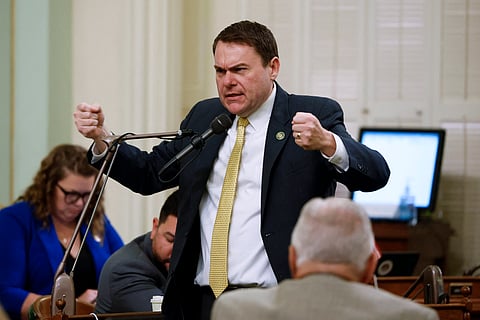
- NEWS
- the EDIT
- COMMENTARY
- BUSINESS
- LIFE
- SHOW
- ACTION
- GLOBAL GOALS
- SNAPS
- DYARYO TIRADA
- MORE

The Texas House of Representatives approved a new electoral map on Wednesday designed to favor Republican candidates and help former President Donald Trump’s party maintain its narrow US House majority in next year’s midterm elections.
The vote came after a dramatic two-week delay, during which more than 50 Democratic lawmakers fled the state to protest what they called an aggressive partisan redistricting effort. Their absence temporarily stalled legislative business and drew national attention to the rare mid-decade redistricting move.
Democratic Representative Chris Turner criticized the plan as “a clear violation of the Voting Rights Act and the constitution,” according to the Texas Tribune. Republican leaders pressed ahead, and the map passed along party lines, 88-52. It now moves to the state Senate and, if approved, will reach Governor Greg Abbott’s desk for final signature.
Redistricting typically follows the decennial US Census, but Todd Hunter, the Republican sponsor of the Texas map, said that “redistricting can be done at any point in time.” He added, “The underlying goal of this plan is straightforward: improve Republican political performance.”
The Texas maneuver has triggered swift reactions nationwide. Democratic lawmakers in California introduced three bills on Monday to allow a voter referendum that could redraw the state’s congressional map this year. Governor Gavin Newsom told reporters, “Nothing about this is normal, and so we are not going to act as if anything is normal any longer. Yes, we’ll fight fire with fire. Yes, we will push back. It’s not about whether we play hardball anymore, it’s about how we play hardball.”
New York Democrats are also weighing responses, with Governor Kathy Hochul labeling the Texas plan a “legal insurrection.”
Former President Barack Obama endorsed California Democrats’ effort, while cautioning against widespread gerrymandering. “On this California issue, I want to see as a long-term goal that we do not have political gerrymandering in America. That would be my preference,” he said at a fundraising event for the National Democratic Redistricting Committee.
Obama emphasized the unusual nature of Texas’s mid-decade redistricting, noting its partisan backing from the White House. “Given that Texas is taking direction from a partisan White House that is effectively saying: gerrymander for partisan purposes so we can maintain the House despite our unpopular policies, redistrict right in the middle of a decade between censuses – which is not how the system was designed; I have tremendous respect for how Governor Newsom has approached this.”
At an event, which also featured Nancy Pelosi and former Attorney General Eric Holder, Obama highlighted the temporary and targeted nature of the Democratic response. “We’re not going to try to completely maximize it,” he said. “We’re only going to do it if and when Texas and/or other Republican states begin to pull these maneuvers. Otherwise, this doesn’t go into effect. And we’re going to do it in a temporary basis because we’re keeping our eye on where we want to be long term. I think that approach is a smart, measured approach, designed to address a very particular problem in a very particular moment in time.”
Obama also urged Texas Republicans to reconsider their plans. “I’d love to see the people of Texas reject what’s happening, but it doesn’t look like, unlike in California, they’re being given the option of deciding whether this is a smart thing to do or not,” he said. He added, “I’ve had to wrestle with my preference, which would be that we don’t have political gerrymandering, but what I also know is that if we don’t respond effectively, then this White House and Republican-controlled state governments all across the country, they will not stop, because they do not appear to believe in this idea of an inclusive, expansive democracy.”
The Texas vote has escalated concerns about the potential for similar partisan redistricting in at least six other Republican-led states, including Ohio, Missouri, New Hampshire, Indiana, South Carolina, and Florida, raising the stakes for both parties in the 2026 midterm elections.
